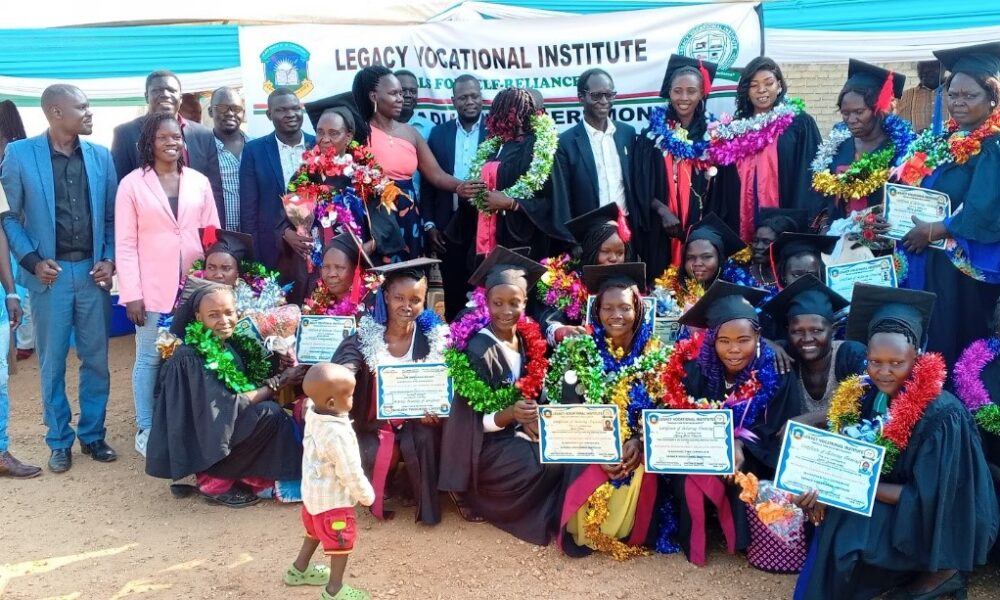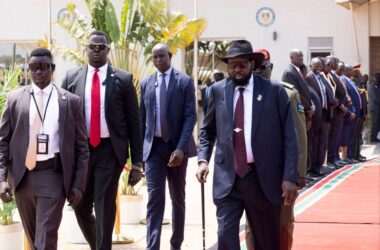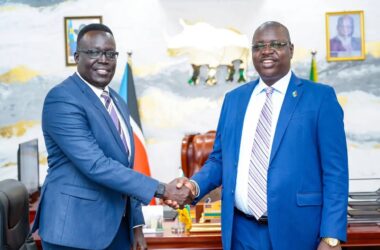By Dogga Luwo
A group of 35 women and girls, along with one male, have graduated from Legacy Vocational Institute, having successfully completed a comprehensive life skills training program.
After 6 months of intensive training, the graduates are now equipped with skills in tailoring, fashion design and garment making, bedsheet designing, table clothes, cushion making soap-making and bakery.
During the graduation on Saturday in Juba, participants showcased their newly acquired skills, displaying a variety of fashions they crafted during their training.
“We were staying at home doing nothing, but now we can make soap and bedsheets,” said one of the graduates, Mary Kur Kur.
She highlighted that training women would enhance their economic independence, thereby reducing reliance on men.
“Legacy Vocational Institute and its partners have opened our eyes. We have learned, and we are different from other women,” Mary expressed, thanking the institute for the opportunities provided.
With the skills they have gained, she said they plan to extend their knowledge by training more women in their communities, particularly in skills like soap making. Mary said that women do not belong solely in the kitchen.
“Thank you for the support; let the organization continue to support and train more women,” she urged, urging men to support women in pursuing such skill training.
Susan Opani Nicholas, the Executive Director of Legacy Vocational Training Institute, stated that the institute started in 2021 as a home-based production centre.
After women recognized the exceptional quality of her work, Opani said she began receiving requests from numerous women seeking training opportunities. She then initiated the training program, starting with a single machine.
What began as a humble home-based production centre has quickly evolved into a thriving institution, now offering training to the most vulnerable individuals in society at a very low cost.
She noted that the institute now has three branches in Hai Tarawa, Lologo Two, and Gumbo.
In addition to liquid soap making, Ms. Opani revealed that the institute is involved in savings initiatives and engages women in peace-building skills.
In his part, Nicholas Sebit, the Co-Founder of the institute said their policies align with the government’s free education initiative, asserting that such training programs provide opportunities for those unable to read and write.
“Some of the graduates you see here, are not able to read or write, but education doesn’t mean speaking English or writing; it is about knowledge,” he explained.
Sebit stressed that education is an agent of change and social development, urging the graduates to apply the knowledge they have gained to improve their social status.
“May this graduation empower you to become agents of social development,” he concluded.
Isaac Aloro Modi, a Member of Parliament in Central Equatoria State, praised Legacy Vocational Institute for its role in bridging educational gaps for those who have not had the opportunity to study.
Meanwhile, Alex Mana Sebit, who spoke on behalf of Peter Lomude, Chairperson of the Constituent Development Committee in the National Assembly, noted that vocational training has proven to be highly effective in other countries.
He pointed to Ghana and Nigeria, where a significant portion of the clothing industry is driven by skilled individuals who received training from vocational institutions.
He expressed gratitude to Legacy for providing such opportunities and advised the graduates to focus on the quality of their products. He also urged partners to support such centers to equip more vulnerable groups with life-changing skills.
South Sudan has one of the lowest literacy rates in the world, with nearly 70 per cent of unable to read or write.
Luate William, the Director General of the Ministry of General Education, Central Equatoria State, stated that such training initiatives will help change the narrative.
“If we want to build our society, we must strengthen our education system because education is an important tool. Let us invest in education,” he said.
He thanked the institute for empowering vulnerable people with life-changing skills and pledged the government’s continued support for vocational schools like Legacy Vocational Institute.
The training was conducted in partnership with Initiative for Peace Communication Association (IPCA) and Japan International Cooperation Agency (JICA)




